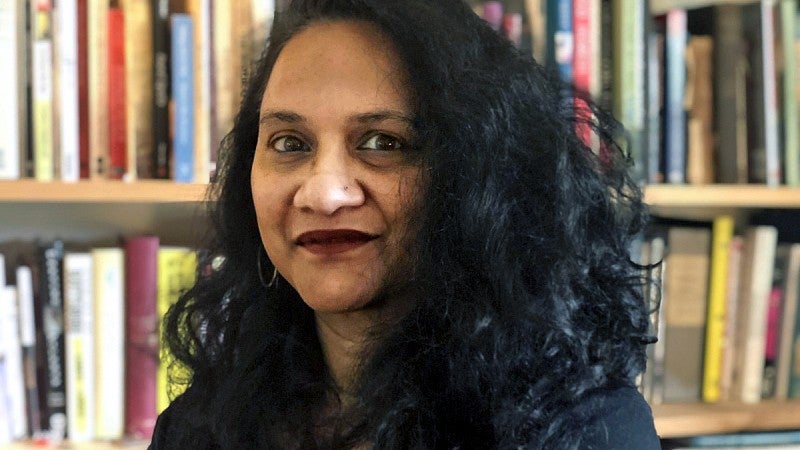Although Dr. Kumi Silva wrote most of her dissertation while living 1,000 miles away from Eugene, she has fond memories of the University of Oregon School of Journalism and Communication (SOJC).
Silva graduated from the SOJC's Communication and Media Studies PhD program in 2004. Her doctoral and postgraduate work is at the intersection of gender, feminism and identity in modern cultural phenomena.
Silva applied to the doctoral program because she liked the department and research structure. She also appreciated the UO’s strong graduate student union.
“The institution had this really well-established way of taking care of its graduate students, and I was really excited about that,” Silva said. “It was an amazing community of people and scholars.”
While Silva pursued her doctoral degree at the UO, her partner worked towards his PhD at the University of Illinois Institute of Communications Research. Silva lived in Urbana while working on her dissertation and would visit the UO to meet with her advisor, professor Leslie Steeves.
Silva’s research focused on social movements and feminism in India and Sri Lanka. She looked into what kinds of communicative strategies these movements used to articulate their politics and how feminism framed their activism.
When she began her research, Silva worked closely with her committee members to decide what questions she wanted to investigate. They helped her narrow her research focus and determine what kind of fieldwork was feasible.
“I had a committee that was very supportive, so I would get a lot of input and ideas,” she said.
One of the pivotal moments in her fieldwork was recognizing the diasporic elements at play in the relationships she was trying to build.
Silva was born in Sri Lanka, knew the language and lived there when she started her fieldwork. Still, it took time to build trust with the organizations she was studying. She often struggled to get in contact with subjects who saw her as an outsider even though she was Sri Lankan.
“As a graduate student, I was incredibly frustrated at the beginning. But as I kept going back, I understood why that was happening,” Silva said. “They wanted to make sure that I was coming in with the intentions that I said I was coming in with.”
She returned to Sri Lanka and India several times throughout her dissertation process, working with organizations and making connections in the community. This work piqued Silva’s interest in identity-identity and diasporic communities and informed much of her research moving forward.
After graduation, she spent a year working for the Center for African Studies at the University of Illinois. She then moved to Boston to work as an assistant professor at Northeastern University. In 2011, she joined the Department of Communications at the University of North Carolina Chapel-Hill (UNC) and is now an associate professor.
At UNC, Silva helps undergraduate and graduate students explore the intersections of gender, feminism and identity. “I actually get paid to learn, which is like the most amazing thing in the world,” she said.
She incorporates news stories and popular culture into her lectures on how more abstract cultural theories manifest in everyday life. Silva also encourages discussion in classes — whether they are large or small — because she wants students to learn how to build arguments and develop critical-thinking skills. “I'm not really interested in what a student thinks,” she said, “I’m interested in how they think through it and in helping them understand where their approach to the topic or idea comes from.”
In 2014, Silva co-edited Feminist Erasures: Challenging Backlash Culture. Silva met Kaitlynn Mendes while the two were co-editors for the journal Feminist Media Studies’ commentary and criticism section. Together, they compiled essays exploring how the backlash to feminism manifests in different contexts and in different parts of the world.
She published her first single-authored book, "Brown Threat: Identification in the Security State," in 2016, after working on her dissertation. In the aftermath of September 11, she began to reflect on the dynamics between identity and power and how they are manipulated to build social systems. She argued that “brown” has shifted from an identity to an identification based on xenophobia and racism. Silva admitted the book was hard to write because she felt so strongly about the topic.
Although she published the book almost five years ago, Silva believes the content is particularly relevant to the political and cultural issues at play in today’s society. “I think the arguments I make in ‘Brown Threat’ really consistently keep coming up in the ways that identity is manipulated, the ways that it is used to gain power by particular actors.”
Silva and co-editor Margaret Franz published "Migration, Identity, and Belonging: Defining Borders and Boundaries of the Homeland" in 2020. Writers from around the world contributed to the book. Many spoke about their own experiences with borders and crossing borders, and how politics, culture and society perpetuate the fictitious idea of a “nation.”
To Silva, intersectionality should be a central focus of journalistic training. Through her work in and out of the classroom, she strives to show how this training can help future generations be smarter and more thoughtful about the world.
“I have the best job in the world,” Silva said, smiling. “I honestly believe that.”
By Shannon Golden, class of '22
Shannon Golden, class of ’22, is a journalism major in the SOJC. She is minoring in global studies and is particularly interested in international journalism. Golden currently works as a student writer for the SOJC Communication Team.

